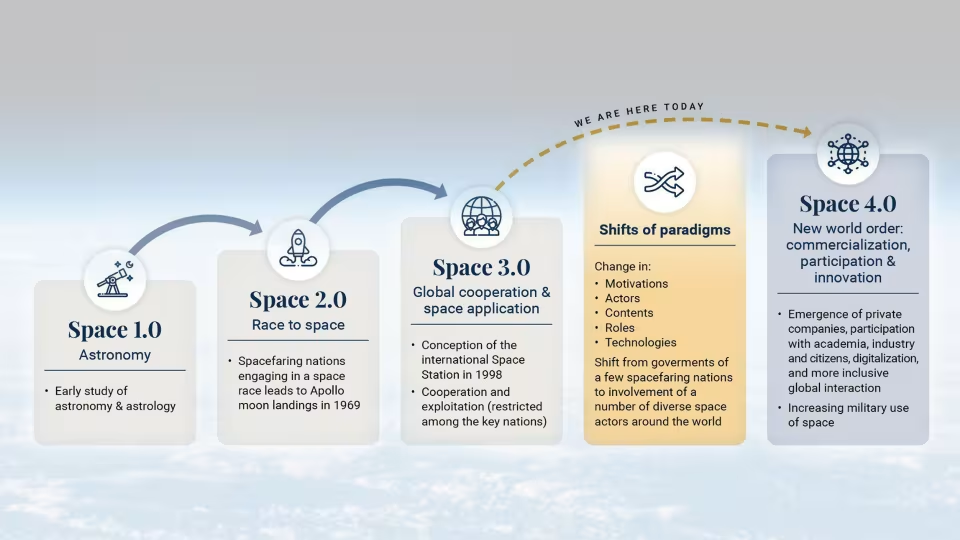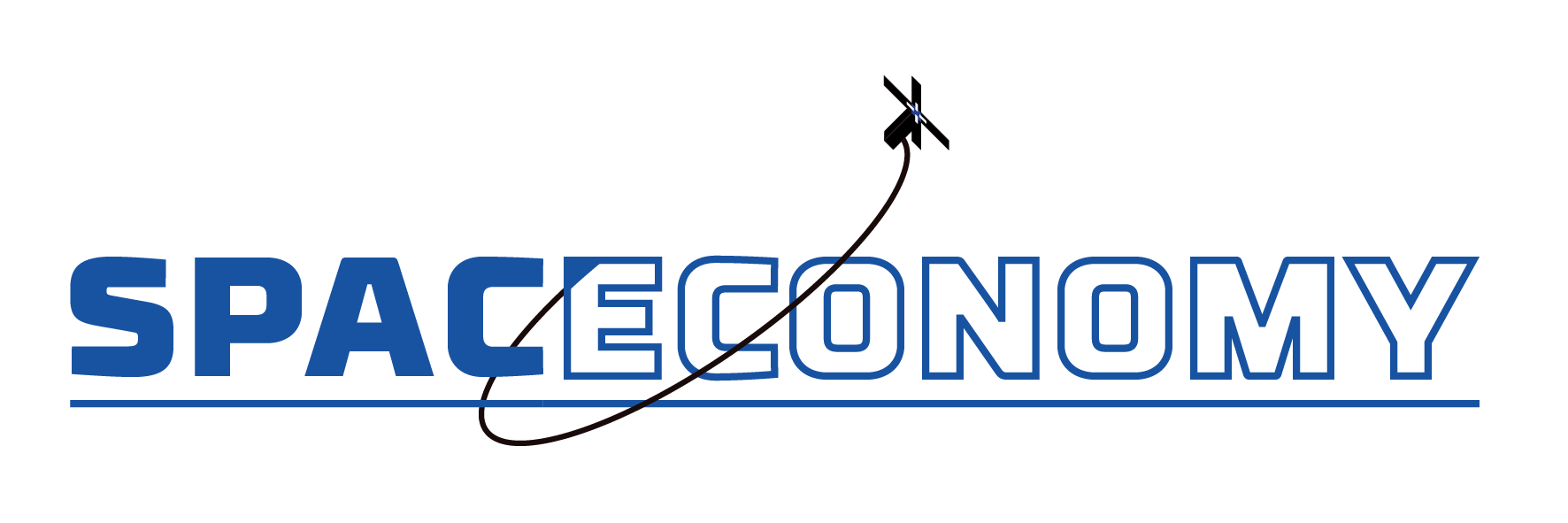Central idea of project and answers to programme questions A–E

The SPACECONOMY project aims to prepare Finland for maximizing the societal and economic potential of the sustainable and inclusive development of the global space economy. By harnessing space-based data, AI and transdisciplinary collaboration, the project addresses strategic challenges at the intersection of economic resilience, sustainable development, innovation policy and social cohesion. It proposes a coordinated national space data ecosystem that advances scientific excellence while delivering tangible policy solutions and welfare gains in an era of global uncertainty and strategic competition. A major paradigm shift is underway in the global space economy, as illustrated in Figure 1. - the new space transformation timeline. Historically, the space domain evolved from early astronomy to Cold War-era space exploration and technological rivalry, followed by an era of peaceful global cooperation through large-scale missions and space applications for Earth observation, communication and navigation. We have now entered the New Space era - defined by commercialization, privatization and increased geopolitical tension. Space innovation is now market-driven, with more actors competing.
Market dominance and technological supremacy have become intertwined goals, with commercial access to space dramatically lowering the entry barrier. In all of this, AI is a necessary tool to handle the ever-growing complexity of space services. AI accelerates the transformation of datasets into actionable insights, supporting faster and more accurate decision-making. Intuitive AI-driven user interfaces will democratize access to space-based information, empowering non-expert users and expanding the adoption of space services beyond traditional specialist domains. By lowering barriers and enhancing scalability, AI is also driving business model innovation and service diversification, opening new markets and creating opportunities for sustainable growth across the economy.
Finland, with its strong ICT base, emerging space industry and public sector leadership in sustainability, is uniquely positioned to seize this opportunity. SPACECONOMY is therefore crucial right now, providing the strategic coordination, research excellenceand societal dialogue needed to ensure Finland thrives in this new landscape.
A. Focused challenges and their integration
SPACECONOMY focuses on the key interlinked challenges highlighted by the WELEC programme:
Work Packets
Productivity growth and strengthening competitiveness
Produces new models for utilizing satellite data and AI technologies to enhance productivity and drive innovation, particularly in high-tech sectors.
WP1, WP3 - Economic and societal stability and resilience
Builds space-based and AI-driven solutions to strengthen Finland’s economic resilience and ensure the sustainability in welfare systems.
WP4, WP5, WP6 - Attracting investment and leveraging intangible capital
Builds a national space economy ecosystem that enhances Finland’s attractiveness for investments and strengthens the role of intangible assets such as data, AI, and human capital.
WP2, WP3 - Sustainable economy and securing welfare for future generations
Ensures regional inclusion and societal acceptance in the context of technological disruption with future-ready education and emphasis on long-term public welfare.
WP2, WP4, WP6 - Harnessing the opportunities and managing the risks of AI
AI is a central enabler, improving productivity, decision-making, and societal resilience. The project also addresses responsible AI practices and risk management associated with space data applications.
All - Responding to changes in natural resource use
Uses Earth Observation technologies to support evaluation of natural resources and environmental resilience.
WP1, WP6 - Responding to the rapidly changing international environment
Builds international partnerships and develops scalable, globally relevant models for competitiveness and resilience.
All
These challenges are approached as an integrated system, reflecting the complex interdependencies of the New Space paradigm, which combines technological opportunity with ethical, regulatory and geopolitical risks.
B. Cross-disciplinary understanding and conditions for sustainable reform
By integrating disciplines across economics, AI, space technology, strategic and industrial management, economic sociology, political sciences, regional studies, public governance and education, the project supports a deep understanding of how the space economy can contribute to Finland’s prosperity and sustainability. The project’s WPs include scenario-building for policy, pilot use cases in different regions and tools for assessing social and environmental impacts. These will generate the conditions for sustainable reform by producing models for targeted investment in space innovation, guiding education and workforce transitions in support of future skills as well as informing decision-making under uncertainty and rapid technological change.
C. Supporting solutions through research fields and interaction networks
The consortium includes institutions with complementary expertise and extensive networks across academia, policy, industry and civil society. These networks will be used to translate research outputs into scalable solutions. The project emphasizes structured interaction with national and regional authorities, Finnish space companies, EU-level institutions and citizens. This ensures the research is embedded in policy and practice, increasing uptake and long-term impact.
D. The role of AI
AI plays a central role in realizing the promise of the New Space era and is a core enabler of SPACECONOMY. AI supports automated satellite data fusion with socio-economic and environmental indicators, system-level impact modelling, and responsible innovation through explainable, human-centred methods. The project develops new AI/ML tools for situational awareness, early warning, and societal resilience, while assessing risks and limitations. Educational and outreach efforts ensure broad access to these outcomes, enhancing societal capacity to benefit from space- and AI-driven transformation.
E. Societal impact and beneficiaries
SPACECONOMY seeks to ensure that the benefits of the space economy are widely distributed socially legitimate. Its intended societal impacts include evidence-informed policy for space innovation, resilience and equitable growth, increased regional capacity and opportunity through tailored applications of space data (with an emphasis on welfare service development), public engagement through participatory education, citizen science, and open data.
The project also aims to support SMEs and new market entrants in the New Space value chain. Beneficiaries include national and regional policymakers, the Finnish space industry, educational institutions, civil society, and end users across agriculture, energy, transport and logistics. The project’s timing and orientation align perfectly with Finland’s recently renewed national strategy for space - and the urgent need for economic renewal and resilience in a rapidly changing global context.
SPACECONOMY strengthens Finland’s role as a self-reliant, innovation-driven space economy while deepening international, especially European, collaboration. It will help develop a coordinated ecosystem for AI- and space-based services that support climate action, resilience, and inclusive welfare and public services. The project fosters investment, talent, and trust through open science, education, and regional innovation - advancing sustainable growth and societal well-being in the digital and green transition.
